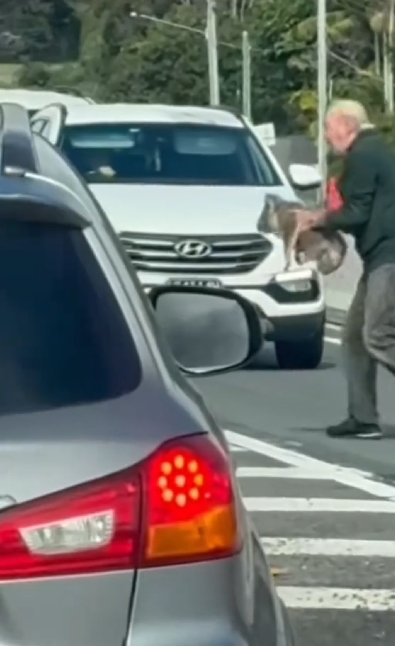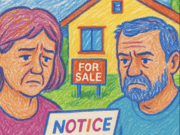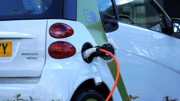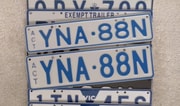
When 82-year-old Terry stepped out of his car on Queensland's busy Beaudesert-Beenleigh Road and gave a wayward koala the talking-to of its life, he had no idea he was about to become Australia's newest folk hero. But behind the laughs and the viral fame lies a sobering truth that every Australian needs to understand.
The footage of Terry scolding the furry wanderer like a misbehaving grandchild has captured hearts nationwide, but it also highlights a much more serious issue facing our iconic marsupials. What started as a delightful slice of Australiana has become a window into one of our country's most pressing conservation crises.
Terry's gentle but firm approach - 'I was telling him not to scratch because I'm trying to help him, and the little mongrel just kept scratching' - might have been pure instinct, but he actually did almost everything right. His story isn't just a feel-good moment; it's an unintentional masterclass in wildlife rescue that more of us might need to know about.
In this Article
'I was telling him not to scratch because I'm trying to help him, and the little mongrel just kept scratching'
What Terry Got Right (And What We Can Learn)
What Terry did instinctively aligned remarkably well with expert recommendations. While his gentle scolding was pure personality, his hands-on approach was spot on. Wildlife experts suggest that the best way to grab a koala is to pick them up by their hands, almost like a monkey, so they can't grip onto you.
Terry's quick thinking and confidence were crucial. Koalas may look cuddly, but they have powerful claws and can inflict serious scratches when frightened. His calm, assured handling likely prevented the animal from panicking further.
However, professional rescuers emphasise that when a rescue is carried out successfully, there is no direct human contact with the koala. Instead, they use a capture bag and carry basket only. This is for the health and safety of rescuers in addition to the wellbeing and respect for the wild koala.
The Sobering Reality Behind the Viral Moment
While we're all laughing at Terry's stern words, the reality behind koala road encounters is sobering. The numbers are staggering and heartbreaking.
Throughout 2023, researchers counted 145 otherwise healthy koalas struck and killed along a 51-kilometre stretch of highway in Central Queensland. This is a huge figure. By contrast, an average of 365 koalas are admitted to veterinary hospitals each year after being hit by a vehicle across the entire south-east Queensland region.
To put this in perspective: researchers tracking a single stretch of highway found that 145 otherwise healthy koalas were struck and killed along just 51 kilometres in 2023 alone. That's nearly three koalas every week on just one road.
The koala population dropped a reported 30% from 2018 to 2021. In February 2022, the koala was listed as 'ENDANGERED' in Queensland, NSW and the ACT under the EPBC Act. As at March 2024, the latest estimate of population size for koalas in Queensland, New South Wales and the Australian Capital Territory is between 95,000 and 238,000.
Did you know?
What Does This Mean for You?
Koalas are now officially endangered in Queensland, NSW, and the ACT. This means they're at serious risk of becoming extinct in the wild within our lifetimes. Vehicle strikes are one of the biggest threats they face, making encounters like Terry's both more common and more critical.
Why Koalas End Up on Our Roads
Understanding why koalas end up on roads helps explain why Terry's rescue was so necessary. Studies have shown that koalas will travel across areas dangerous to them, such as roads and open spaces, to seek suitable feed trees, a mate, or their own territory when they are at their most vulnerable.
Despite being tree dwellers who spend over 20 hours sleeping, koalas don't swing from branch to branch like monkeys. When they need to move between trees, they come down to ground level and walk slowly and deliberately, making them sitting ducks for passing traffic.
The timing makes it even more dangerous. Koalas are most active at night and around dawn and dusk, precisely when drivers' visibility is poor. Add in breeding season behaviour, when young males are searching for territory and mates, and you have a perfect storm for road encounters.
Safety Tips for Senior Drivers
As experienced drivers, we know the roads can be unpredictable, but wildlife encounters require special consideration. Here's what safety experts recommend:
Avoid driving at dawn and dusk because native wildlife generally come out to feed at these times. Scan the road and verges ahead of you as you drive. Animals such as kangaroos, wombats and koalas are most active at dawn and dusk and are known to wander onto roads.
Whenever possible, do not drive at night outside of towns and major cities. A lot of Australian wildlife comes out at night - especially kangaroos. Kangaroos move around more at night than they do in the day. Dawn and dusk are the times to really be on the lookout.
Wildlife Emergency Contacts
NSW: WIRES - 1300 094 737
QLD: Wildcare Australia - 07 5527 2444
QLD (Koalas only): Koala Rescue Queensland - 07 5527 2444
VIC: Wildlife Victoria - (03) 8400 7300
National: Wildlife Rescue Australia - 1300 596 457
General animal emergencies: RSPCA - 1300 ANIMAL
When you drive slower in poor visibility, where bushland comes right up to the edge of the road or where animals are known to roam, you'll give yourself a better chance of avoiding a collision with an animal - which can save the life of the animal and possibly prevent injury to you and damage to your vehicle. Whenever you can when driving, use your high beam lights so that you can see the sides of the roads better and further down the road at night.
If You Encounter Wildlife on the Road
If the koala is still on the road, it is imperative that you stay in a safe location. Turn your car hazard lights on and do not try to move the koala off the road if it is not safe to do so. Remember human safety must always be the first priority.
If you encounter an injured animal during a drive, you're best off calling a local wildlife rescue organisation for support. An experienced koala rescuer will provide you with further instructions based on the circumstances. If the koala appears to be injured or shows signs of disease, please telephone your local wildlife rescue organisation so that a specialised koala rescuer can assess the animal.
If you're confident about helping and it's safe to do so, if possible, place a blanket, towel or jumper over the koala. This not only reduces stress but also helps to discourage the koala from wandering off. Do not put the koala in your car unless instructed by a wildlife volunteer. Koalas that have been hit by cars will often be disorientated and appear placid but they can regain their senses quickly and pose a serious risk to the occupants of the car.
The Heroes Working Around the Clock
Terry isn't alone in his commitment to native wildlife. Queensland has an extensive network of dedicated volunteers working around the clock. Koala Rescue Queensland is a not-for-profit 24-hour rescue service for sick, injured and orphaned koalas throughout Queensland.
The commitment of these volunteers is remarkable. They regularly work late into the night, responding to calls about injured animals, often dealing with heartbreaking situations. During peak times, some volunteers report rescuing multiple animals per week, with vehicle strikes being one of the most common calls.
During one 24-hour period recently, one volunteer came to the aid of seven koalas - three were hit by cars. One died in her arms. This is the reality facing our wildlife carers every single day.
What You Can Do to Help
The koala crisis won't be solved by viral videos alone, but there are practical ways we can all contribute:
Report wildlife sightings: Two koala sighting mobile apps have been released to help researchers track population numbers and movement patterns.
Support wildlife organisations: Many rescue groups are entirely volunteer-run and rely on donations for equipment, veterinary care, and vehicle costs.
Be a wildlife-aware driver: Every careful driver potentially saves lives. For drivers, especially those in rural and semi-rural areas, wildlife encounters are inevitable. The key is being prepared and knowing how to respond when you spot an animal on the road.
Share the knowledge: Talk to family and friends about wildlife safety. The more people know what to do, the better outcomes we'll have.
What This Means For You
Terry's moment of fame has given us all a gift - a chance to laugh, but also a chance to learn and act. His courage in stepping out to help shows the Australian spirit at its best, but it's also highlighted just how much our native wildlife needs our help.
Koalas are now listed as Endangered in Queensland, NSW and the ACT, but we're determined to save these precious populations from the brink of extinction. By working together, we can turn the tide for koalas.
The next time you're driving through koala country, remember Terry's story - not just for the laughs, but for the lesson. Keep your eyes peeled, your speed down, and your emergency numbers handy. Our furry friends are counting on us.
Have you ever had a wildlife encounter while driving? What advice would you give to other seniors about staying safe on our roads? Share your stories and tips in the comments below - your experience could help save both human and animal lives.
Grammys 2025: Social media reacts to viral Bianca Censori and Jaden Smith red carpet looks | Euronews
As for Jaden Smith... Well, take a look for yourselves.
https://www.euronews.com/culture/20...anca-censori-and-jaden-smith-red-carpet-looks
Grammys 2025: Social media reacts to viral Bianca Censori and Jaden Smith red carpet looks | Euronews
https://www.euronews.com/culture/20...anca-censori-and-jaden-smith-red-carpet-looks
Helping koalas in emergencies | Native animals | Environment and Heritage
https://www2.environment.nsw.gov.au...-in-emergencies/helping-koalas-in-emergencies
Wildlife vehicle strike and contributing factors
A NSW Government website · Environment and Heritage · menu Open Menu · search Show Search · close Close search · close Close Menu · Topics keyboard_ar...
https://www.environment.nsw.gov.au/...ehicle-strike-contributing-factors-200229.pdf
Wildlife vehicle strike and contributing factors
https://www.environment.nsw.gov.au/...ehicle-strike-contributing-factors-200229.pdf
Rescue with a twist: How one man’s unexpected talk saved a koala’s life | YourLifeChoices
To put this in perspective, researchers tracking a single stretch of highway in Central Queensland found that 145 otherwise healthy koalas were struck...
https://www.yourlifechoices.com.au/life/terry-koala-rescue-queensland-viral-hero/
World Endangered Species Day 2024 - Friends of the Koala
We know most Australians are proud of the beauty of our country and want to protect it.
https://friendsofthekoala.org/world-endangered-species-day-2024/
World Endangered Species Day 2024 - Friends of the Koala
So the question arises, why are we a world leader in animal extinctions and what can be done to reverse this trend?
https://friendsofthekoala.org/world-endangered-species-day-2024/
National Koala Monitoring Program - DCCEEW
The latest population estimate generated using the NKMP moves closer to the 2023 adjusted population estimate.
https://www.dcceew.gov.au/environme...cies/koalas/national-koala-monitoring-program
Koala conservation - Wikipedia
The Australian government declared the species as endangered by extinction in 2022.
https://en.wikipedia.org/wiki/Koala_conservation
Koala conservation - Wikipedia
Populations in Victoria and South Australia appear to be abundant; however, the Australian Koala Foundation argues that the exclusion of Victorian pop...
https://en.wikipedia.org/wiki/Koala_conservation
What to do if you run into wildlife on Australian roads | Shell Australia
https://www.shell.com.au/motorists/...ou-run-into-wildlife-on-australian-roads.html
Wildlife Safety Tips for Hikers and Campers | REI Expert Advice
In the backcountry, store things in a bear canister, bear bag or metal food locker, or hang them in a bag from a tree or pole, when you're not using t...
https://www.rei.com/learn/expert-advice/wildlife-safety-tips.html
Navigating Around Wildlife While Driving In Australia | Tyres & More
Follow the road rules as you usually would. Take notice of signs that may warn you of areas where animals are present, but also make sure that you’re ...
https://www.tyresandmore.com.au/news/navigating-around-wildlife-while-driving-in-australia
Navigating Around Wildlife While Driving In Australia | Tyres & More
There are a range of wildlife rescue groups that you can call to get them the assistance they may need. If the animal is a domestic pet, such as a cat...
https://www.tyresandmore.com.au/news/navigating-around-wildlife-while-driving-in-australia
Koala Rescue Queensland
https://www.koalarescueqld.org/
Wildlife Safety Tips for Hikers and Campers | REI Expert Advice
Learn more in our article Food Storage and Handling for Campers and Backpackers.
https://www.rei.com/learn/expert-advice/wildlife-safety-tips.html
Video of failed koala rescue disturbs wildlife carers
During on 24 hour period this week, she came to the aid of seven koalas three were hit by cars. One died in her arms.
https://au.news.yahoo.com/tik-toker...rong-its-about-to-f-her-day-up-013002403.html
Koala conservation - Wikipedia
While the koala was previously classified as Least Concern on the Red List, it was uplisted to Vulnerable in 2016.
https://en.wikipedia.org/wiki/Koala_conservation
Rescue with a twist: How one man’s unexpected talk saved a koala’s life | YourLifeChoices
The key is being prepared and knowing how to respond when you spot an animal on the road.
https://www.yourlifechoices.com.au/life/terry-koala-rescue-queensland-viral-hero/
Beloved symbol of Australian wildlife, koalas officially become endangered species | World Economic Forum
'Australia’s national environment laws are so ineffective they have done little to stem the ongoing destruction of koala habitat in Queensland and NSW...
https://www.weforum.org/stories/202...-koalas-officially-become-endangered-species/







